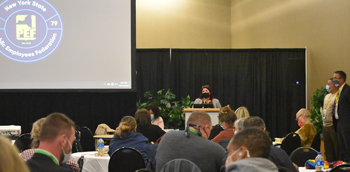November 17, 2021 — Many PEF members continue to face challenges due to the ongoing COVID-19 pandemic, especially fear of returning to increasingly occupied offices.
The PS&T contract contains a Memorandum of Agreement (MOA) that requires state agencies to develop telecommuting policies in collaboration with PEF within nine months of the July 27 ratification of the contract, but members need to get involved in the process and suggest changes for improvement.

“The contract provides a framework,” Statewide Director of Field Services Katie Vorwald told delegates attending a telecommuting workshop at the 2021 PEF Convention. “It’s all about the advocacy and the strength of the data you have.”
Agency telecommuting policies must be developed with PEF and should include provisions for where within the agency telecommuting is programmatically feasible. Policies should also contain provisions mutually agreed upon, such as employee removal from a telecommuting program. If access to the employee’s home worksite by management is permitted, specific reasons for access and specific notice requirements must be developed in the labor/management forum.
What’s Allowable?
Members should understand that the other provisions of the PEF contract are still in effect, which can impact the leverage PEF has in discussing telecommuting agreements.
“Telecommuting is not license to flex time or work overtime. Members need to maintain their schedule, submit time off requests for the use of sick and vacation time,” said Regional Director of Field Services Eric Kwasniewski.
The state cannot assign members out-of-title (OOT). work under the MOA.
“If it’s getting inappropriate, file an OOT claim,” Kwasniewski said. PEF can work toward getting owed back pay or a cease and desist order against the agency.
“They should not be giving you extra work,” Vorwald said. “Take that up at your labor/management.”
Time keeping is also prohibited.
“The purpose of reports and work plans should be clearly identified for record keeping, not time keeping,” Kwasniewski said. Work logs can list assignments for periods of the day, but these cannot be an hourly log that could be used to track time.
Members are required to follow all work rules and policies while telecommuting.
“Even though you are not in the office, while working on a state computer you should continue to abide by computer usage policies, such as appropriate internet usage and email correspondence,” Kwasniewski said. “You will be required to maintain expected work product and productivity standards.”
Telecommuting may not be feasible for all job titles, but specifics related to employee involvement must be developed with PEF at the agency labor/management table.
Members had many questions about specific issues they face at work.
One detailed how employees with higher productivity were getting more days to work from home. That is not appropriate, said PEF Vice President Sharon DeSilva.
“Telecommuting should not be based on arbitrary work product,” she said. “Agencies must have overall standards. Some departments will have independent discretion based on their needs, but starting to pick one person over another could be problematic.”
“Criteria must be objective and consistently applied,” Vorwald agreed. “If there is any sense of favoritism, that may not be objective.”
In some cases, when short-term needs arise, temporary work-from-home plans can be made independent of longer-term telecommuting arrangements.
Grieving the MOA
When reasonable accommodations for continued telecommuting are denied, members are understandably upset.
You can file an appeal under the processes in the agency-wide telecommuting policies. Additionally, if the denial is related to your own health issues, or you feel the denial was discriminatory, you can file a complaint with the Division of Human Rights, EEOC and/or directly with GOER’s Anti-Discrimination Department. Contact your Steward or Field Representative for more information.
“If you appeal a denial, it’s PEF’s position that an appeal process in the telecommuting agreement should include a union representative,” said Vorwald. “We also don’t want to see it fall to people who control your department. These are the people who said no already.”
“The person who makes the initial review should not be the person doing the appeal,” Downstate Field Director Ricardo Cruz reiterated. “Identify who those people are.”
Disputes arising out of the interpretation of the MOA are grievable up to Step 3 of the grievance procedure, except where underlined and italicized in the agreement: those can be appealed through Step 4, arbitration.
It is extremely important that PEF Labor/Management Chairs work with their respective Field Representatives, and can also contact Vice President Sharon DeSilva (who is responsible for training members on labor/management advocacy), to help plan for appropriate discussion of telecommuting policies at the labor/management table.

